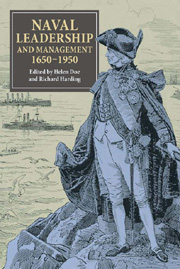Book contents
- Frontmatter
- Contents
- List of Tables
- List of Editors and Contributors
- Acknowledgements
- List of Abbreviations
- Michael Duffy: An Appreciation
- Introduction
- Leadership: The Place of the Hero
- Leadership and Organisational Frictions: Contested Territories
- Management Capability and the Exercise of Naval Power
- 5 High Exertions and Difficult Cases: The Work of the Transport Agent at Portsmouth and Southampton, 1795–1797
- 6 Forgotten or Ignored, the Officers at Invergordon:‘We are doing this for you as well you know’
- 7 ‘To Excite the Whole Company to Courage and Bravery’: The Incentivisation of British Privateering Crews, 1702–1815
- The Evolution of Management Training in the Royal Navy, 1800–1950
- Select Bibliography
- Index
6 - Forgotten or Ignored, the Officers at Invergordon:‘We are doing this for you as well you know’
from Management Capability and the Exercise of Naval Power
Published online by Cambridge University Press: 05 February 2013
- Frontmatter
- Contents
- List of Tables
- List of Editors and Contributors
- Acknowledgements
- List of Abbreviations
- Michael Duffy: An Appreciation
- Introduction
- Leadership: The Place of the Hero
- Leadership and Organisational Frictions: Contested Territories
- Management Capability and the Exercise of Naval Power
- 5 High Exertions and Difficult Cases: The Work of the Transport Agent at Portsmouth and Southampton, 1795–1797
- 6 Forgotten or Ignored, the Officers at Invergordon:‘We are doing this for you as well you know’
- 7 ‘To Excite the Whole Company to Courage and Bravery’: The Incentivisation of British Privateering Crews, 1702–1815
- The Evolution of Management Training in the Royal Navy, 1800–1950
- Select Bibliography
- Index
Summary
This chapter looks at a forgotten part of the Royal Navy of the 1920s and 1930s – its junior executive officers. Most junior regular naval officers are always in the background; only when they become commanders, captains and flag officers do they move forward on the stage. Otherwise they are almost a ‘dull, slight, cloudy naught’. What of these officers; how were they trained and how were their careers managed? In particular, what of their morale and personal concerns?
First, a note on sources and in particular Admiralty Fleet Orders (AFOs) as they were known after 1923. These were the Admiralty's way of communicating with the navy, and up to four thousand a year were issued. They came out weekly in six sections, the second covering personnel issues. Being promulgated policy, they can be regarded, in modern terms, as a management bulletin board.
This study concentrates on lieutenants and lieutenant-commanders. Properly speaking the latter was a senior officer. However, until very recently a lieutenant-commander was no more than a senior lieutenant; promotion from lieutenant to lieutenant-commander was automatic at eight years seniority. Scrutiny of the personnel records of 20 per cent of officers commissioned between the two world wars, 494 records, shows that only two of those still serving were not promoted eight years after becoming lieutenant; one because he had lost two years seniority at court martial and the other because he submitted his resignation just before the eight-year point and he left the navy three months later.
- Type
- Chapter
- Information
- Naval Leadership and Management, 1650–1950 , pp. 109 - 122Publisher: Boydell & BrewerPrint publication year: 2012



